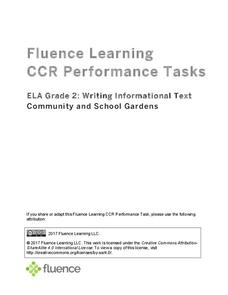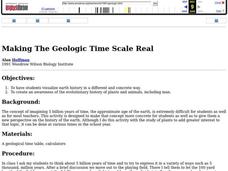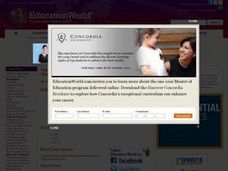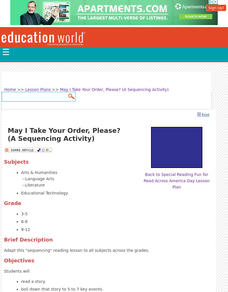Space Awareness
History of the Universe
Your pupils may believe that you and their parents are the oldest things in the universe, but surprise! There are elements of the universe that are even older. Elementary scientists create a class timeline to demonstrate the expansive...
National Park Service
The Young Naturalist
Beginning with a brief history of our 26th president, Theodore Roosevelt, then followed by a discussion of his interest in nature, young scientists take to the outdoors to locate and observe local plants and insects. Scholars return to...
Fluence Learning
Writing Informative Text: Did Shakespeare Write Shakespeare?
William Shakespeare penned some of the richest and most fascinating works of literature—or did he? Middle schoolers read three brief informative passages and conduct additional research to evaluate the claim that Shakespeare did not...
Fluence Learning
Construct Viable Arguments About Adding Fractions
Test mathematicians' knowledge of adding fractions with a brief assessment that challenges them to play teacher while correcting a peer's work. Scholars examine Carl's mathematical response, identify where he went wrong, then solve the...
Fluence Learning
Writing Informational Text: Community and School Gardens
Two informational texts feature community gardens of the past and present and how seeds grow. Scholars read, discuss what they have read, complete a timeline, define words, and compose a brief essay about the texts' main idea.
Fluence Learning
Writing About Informational Text: Everybody Can Bike
A three-part assessment challenges scholars to read informational texts in order to complete three tasks. Following a brief reading, class members take part in grand conversations, complete charts, and work in small groups to research...
Achievement Strategies
CCSS Unit Design Template for PE
From baseball and tennis to capture the flag and four-square, here is a great document that will help you design your next unit on a sport-related activity.
Curated OER
Canoe and Kayak
Students explore canoes and kayaks. In this canoe and kayak lesson, students research the history, parts, and sport of the canoe and kayak. Students then practice how to use a paddle for each boat, and go on a field trip in order to use...
Curated OER
Making The Geologic Time Scale Real
Students are assigned significant geologic events in Earth's history. They convert the date of the events into distances and then space themselves (on an outside playing field) away from other groups, to represent time between various...
Curated OER
Cell 9 Edited: Meiosis
Student list the steps of mitosis with a brief definition of each stage. Then they begin their study of meiosis. They practice placing the stages of meiosis in order using flashcards depicting the Prophase, Metaphase, Anaphase, and...
Curated OER
The Wright Brothers on Hollywood Squares
Students test their knowledge of the Wright brothers by playing "Hollywood Squares." They read (or listen) with comprehension. Students follow the rules as they actively participate in a game to test their reading (or listening)...
Curated OER
Introduction to Computing and Project Development
Pupils use a computer and math to complete a science project. They review a brief history of computers as well as information on different operating formats will be included. In addition, students complete an overview of the hardware...
Curated OER
The Long and Short of It: Summarizing Important Details
Students practice their summarizing skills while listening to a brief biography of Amelia Earhart. Students take notes while the teacher reads the article and write a paragraph that summarizes the important events from Amelia Earhart's...
Curated OER
Species Interactions
Eighth graders explore seven terrestrial biomes. They compare relationships between children, parents and friends to interactions among species. After observing pictures of types of interaction, 8th graders describe the predator-prey...
Curated OER
May I Take Your Order, Please?
Pupils read a story, boil down that story to 5 to 7 key events, create a sequencing quiz to go with the story and have their classmates take the quiz. They will the strategy of sequencing by reading various stories (that they are not...
Curated OER
Play Ball: A Major League Review Game
Apply the game of baseball to a fun review activity. Pupils earn a "base" for each subject question that they answer correctly. This activity can be modified and used for any subject area, including math, social studies, and language arts.
Curated OER
From Where to Where?
Learners find locations based upon their latitude and longitude coordinates. In this latitude and longitude lesson, students locate points on a grid and learn how to use an astrolabe.
Curated OER
Incredible Shrinking Notes
Students listen to a biography of Amelia Earhart. They fill in an index card of the important information. They narrow down those notes to smaller post-it notes. They practice determining important facts in documents.
Curated OER
Hot Wheels
Young scholars observe the action produced by toy cars. In this geometry lesson, students discuss motion and distance as they relate to the movement of a spherical object.They collect data and make conjectures based on their data.
Curated OER
Geometry: Classifying Angles
Students measure, construct, and classify angles as acute, right, straight, and obtuse. Once they have completed an angle worksheet, students use a map of South Carolina to locate cities by constructing the aforementioned angles.





















